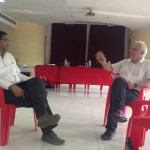– by Spokey Wheeler, International Director, Adhyayan Asia.
This week after 34 months of awarding the Adhyayan Quality Standard (AQS), we at Adhyayan arrived at a huge milestone. We had our very first platinum award. The school, Dominic Savio, Andheri in Mumbai was awarded a National Platinum.
Dominic Savio is a Don Bosco private day school that serves both wealthy and very poor families. It is also home for almost 80 boarding boys drawn from the most challenging backgrounds. The school has wonderful facilities with extensive playing fields and projectors in almost every classroom. However, the classrooms are often cramped and house about 55 children, and sometimes teachers are less than effective.
What is it then that sets Dominic Savio apart from the other 74 schools we have evaluated so far? Especially when the individual areas the school focused its improvement energy on are being successfully addressed by many of our other schools. What Dominic Savio is doing differently is implementing their strategy as a single endeavour, and the impact is profound.
The catalyst for their improvement was unquestionably the manner in which they embraced the School Self Review process. We realised that their progress was likely to be remarkable when they shared with us the results of their mid-term self-review. Instead of making significantly improved judgements to reflect the good work they had already begun in their first year on teaching and learning, they scored themselves much lower than when they had undertaken the original AQS. When, we analysed the data following the achievement of a National Platinum in their second AQS review we found that their performance evaluation against the six key performance areas was exactly the same as ours. Dominic Savio is first of 75 schools to achieve this! But it was the statistic that approximately 90% of the 162 judgements they scored themselves on were the same as that of the Adhyayan external team which is most remarkable. Great schools and school networks around the world know themselves very well!
Snapshots from the AQS at Dominic Savio, Andheri, Mumbai.
But it is the school’s vision of creating sparkling classrooms that has been the catalyst for change. Students are engaged in their own learning in spite of the cramped conditions and 50+ classroom population. Their first endeavour, display and peer learning, was a toe in the water. It was their decision to create an activity-based programme across the core curriculum that prompted the step change. The key to transformation was not simply the personal dynamic leadership of the principal which is outstanding. It was rather his leadership in distributing the accountability for the strategy to one of his co-ordinators, resourcing it, and giving considerable authority to the team that took the project forward. Today, on three days each week, teams of three teachers work in the same classroom across the core curriculum. These teams create comprehensive, differentiated lesson plans. Two of the teachers teach whilst the third observes their delivery. They are supported by daily learning walks of the lead co-ordinator and the leadership team. The feedback the teachers receive ensures that the lessons learned are beginning to develop good practice. And in every classroom for 100% of lesson time students are seated in groups so that peer learning is facilitated. While the school has made a big investment in new furniture, their most important investment has been in staffing this radical approach to teaching and learning.
The schools improvement journey is founded on the practical, daily application of the leadership and management of teaching and learning. It is so persistent that it is becoming owned by teachers, teaching leaders and increasingly, students. Two years ago, the school was led solely by the principal, supported by willing followers. Today he is the leading professional in a team of accountable leaders and managers whose voice is heard and acted upon.







